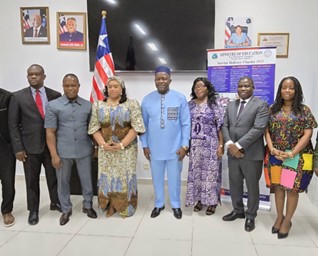Five years have gone into the first six-year term of President George M. Weah, and yet there is no sign of the presidency being invited by the White House, which is traditionally considered a great achievement in the foreign relations for any sitting president of the Republic of Liberia. The Chief Architect of the nation’s foreign policy, President Weah, spent a longer portion of his life in soccer and, therefore, is not too familiar with the diplomatic terms and codes. The Minister of Foreign Affairs, Dee-Maxwell Saah Kemayah, who is the Deputy to the Chief Architect of the nation’s foreign policy, is allegedly banned from entering the world’s greatest capital, Washington, where all major decisions of the world are discussed, leaving Liberia’s seat vacant at the international decision-making table. President Weah’s perceived failure to secure such invitation and cordial relationship with the White House has cost the nation so much, to the extent that even its lone international airport, built by the same Americans decades ago, is about to be outsourced.
Whether officials of the Weah regime are cognizant of the implications or not, the effects are written all on the walls and the country drowned into further dependency syndrome, begging the French, Arabs and Chinese for handouts. This trend of affairs, which seems not to be welcomed, has seen the worse for the Weah administration, with some members of his kitchen cabinet, as well as representatives and senators, being denied visas to the US, while others granted but with restrictions and extreme surveillance.
Recently, the wife of Minister Kemayah, Dialokai Golanyon-Kemayah, who worked at the Liberian Consulate in New York, was declared “persona non-grata” by the US government and asked to leave the country, a situation that somewhat brought the nation’s state of foreign affairs to public disrepute. Minister Kemayah could not make any diplomatic move, not even seek a visa to travel to the US for fear that he would be denied by the embassy, which would bring further embarrassment and disgrace to his portfolio and the Weah administration.

This situation did not befall the Weah administration out of nowhere—agents and representatives of the US government, on a regular basis, report their observation and findings, which provide the basis for the continued tight engagement and the minimum diplomatic openness.
The Americans have warned officials of the Liberian government against corruption, and requested that warlords not be elected or given any serious jobs in government; however, these warnings have fallen on dead heels without any sign of remorse.
During the Ellen Johnson-Sirleaf administration, advocates of justice for victims of the Liberian civil war began pointing out major players of the war and recommending their names for international prosecution since the Liberian government was not taking the matter too serious. Since then, there have been a number of persons enlisted as “most accountable” for the mayhem and the wrath upon the people of Liberia, in addition to those listed by the Truth and Reconciliation Commission (TRC) for prosecution.
During the early years of President Weah’s administration, international intelligence contacted local partners to conduct an investigation into an affidavit submitted on January 8, 2015 by the Executive Director of the Global Justice and Research Project (GJRP), Hassan Bility, that close associates of former warlords, most of whom stand accused of gross human rights violations, war crimes and crimes against humanity, were serving at every level in government and that the government was not doing a good job in assuring Liberians get justice.
In his affidavit to a court in Europe, where GJRP’s partners, Civitas Maxima and others, are based, Bility accused Roland Duo of being a former commander of the National Patriotic Front of Liberia (NPFL) of former President Charles Taylor. He said Duo is the one accused of planning and executing the Maher River Massacre, where people were tied up and dumped into the Maher River but, instead of the Liberian government prosecuting him he was appointed by President Sirleaf as Deputy National Security Advisor, second to another warlord, Dr. Henry Boima Fahnbulleh.

“Alhaji G.V. Kromah, former leader of the rebel group called ULIMO-K, whose fighters are accused of committing the Sinje Massacre, now ambassador-at-large, Robert Beah, a man accused of many summary executions. Others are Senator Prince Y. Johnson, former leader of the INPFL, who murdered former President Samuel K. Doe on video camera; Jewel Howard-Taylor, wife of former President Taylor, now senator; Borbor Haruna of the National Security Agency and formerly of ULIMO as a hitman; Eugene Nagbe of Taylor’s NPFL, now Minister of Youth and Sports, Senator Sando Johnson of the NPFL, Abraham Kromah of ULIMO, now Deputy Director of Police, Republic of Liberia, and many more who occupy high positions in government and are also accused of war crimes, torture, etc.,” Bility’s affidavit to the court read in part.
These allegations, which are not taken lightly by international justice groups and advocates against crimes against humanity, have apparently formed the basis for the stern action against government officials serving in the Weah administration, many of whom served in the Sirleaf era, though in different capacities.
However, the Hot Pepper has been hinted by sources in Washington that the local partners have concluded investigating three individuals accused by Hassan Bility for war crimes and crimes against humanity: Vice President Jewel Howard-Taylor, Maritime Commissioner Lenn Eugene Nagbe, and former Deputy Police Director Abraham Kromah.
While the paper makes effort to garner these reports, observers are predicting that many of those accused will be hooked in the web of crimes against humanity, except for a few persons wrongly accused or whom the investigators did not gather enough evidence to indict. Investigation continues.







